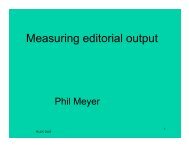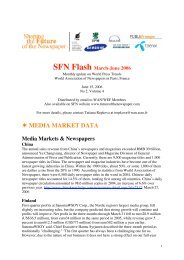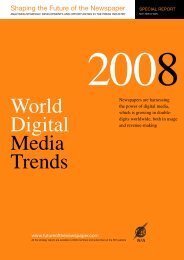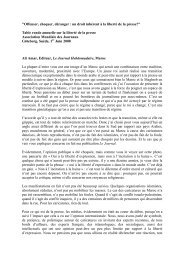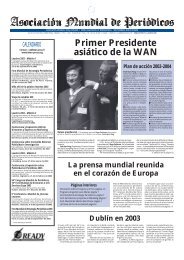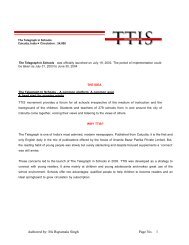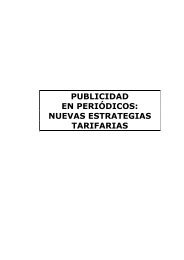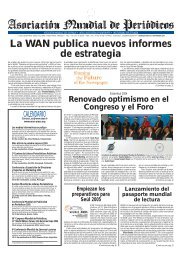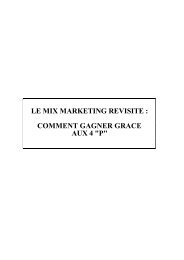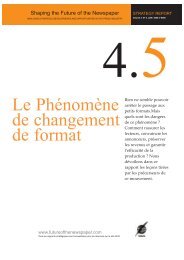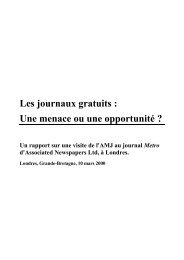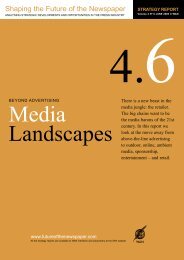WORLD PRESS TRENDS - World Association of Newspapers
WORLD PRESS TRENDS - World Association of Newspapers
WORLD PRESS TRENDS - World Association of Newspapers
Create successful ePaper yourself
Turn your PDF publications into a flip-book with our unique Google optimized e-Paper software.
AUSTRALIA<br />
Under government policy, all proposals for foreign companies<br />
or individuals to acquire 5% or more <strong>of</strong> a newspaper, or to<br />
establish a newspaper, are subject to case-by-case examination<br />
by the Federal Treasurer.<br />
In general terms, the current policy sets the following foreign<br />
ownership limits:<br />
· for national and metropolitan newspapers, the<br />
maximum permitted single foreign stake is 25%,<br />
while other unrelated foreign interests can have<br />
an additional 5%;<br />
· for provincial and suburban newspapers (which<br />
are not usually published daily) foreign interests<br />
are limited to less than 50% for non-portfolio<br />
shareholdings.<br />
These limits may be exceeded with approval from the Federal<br />
Treasurer. Existing foreign interests were allowed to remain in<br />
place when this policy was introduced.<br />
Is there any law prohibiting daily newspaper or periodical publishers<br />
from operating radio or television stations in the same locality Yes,<br />
there are very complex laws. In summary, a proprietor would<br />
not be allowed to own both a major metropolitan newspaper<br />
and a free-to-air television station in the same market. If the<br />
Australian Broadcasting Authority is satisfied that 50% or more<br />
<strong>of</strong> the circulation <strong>of</strong> a newspaper is within the same area as a<br />
broadcasting licence, then the newspaper will be an associated<br />
newspaper <strong>of</strong> that licence. There are also restrictions on the<br />
ownership <strong>of</strong> pay-TV stations in these markets. The<br />
interpretation <strong>of</strong> markets becomes hazier with national<br />
publications, which are evaluated on a state-by-state basis.<br />
So as to guarantee disclosure and transparency in the capital structure<br />
and to avert silent partnerships, is there a law or rule making it possible<br />
to determine who actually owns a publishing company In respect<br />
<strong>of</strong> public companies, notification <strong>of</strong> the acquisition <strong>of</strong> a<br />
substantial shareholding must be made to the Australian<br />
Securities and Investments Commission (ASIC) and the<br />
company in which the shares are held. Any person can obtain<br />
a search from the ASIC that will provide information regarding<br />
shareholdings <strong>of</strong> any proprietary company (including ultimate<br />
holding company details, where applicable), and lodged notices<br />
in respect <strong>of</strong> any given company. The Australian Stock<br />
Exchange also retains records that can be accessed by any<br />
person.<br />
In the case <strong>of</strong> substantial foreign holdings, the Federal Treasury,<br />
through the Foreign Investment Review Board, must also be<br />
notified. Finally, the Australian Competition and Consumer<br />
Commission takes an interest in all areas under the Trade<br />
Practices Act where it feels that any lessening or restriction in<br />
competition might occur.<br />
52<br />
<strong>WORLD</strong> ASSOCIATION OF NEWSPAPERS - <strong>WORLD</strong> <strong>PRESS</strong> <strong>TRENDS</strong> 2003




